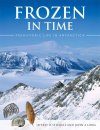Out of Print
By: Jeffrey D Stilwell and John A Long
238 pages, colour & b/w photos, colour & b/w illustrations
![Frozen in Time Frozen in Time]()
Click to have a closer look
About this book
Contents
Biography
Related titles
About this book
No other continent on Earth has undergone such radical environmental changes as Antarctica. In its transition from rich biodiversity to the barren, cold land of blizzards we see today, Antarctica provides a dramatic case study of how subtle changes in continental positioning can affect living communities, and how rapidly catastrophic changes can come about. Antarctica has gone from paradise to polar ice in just a few million years, a geological blink of an eye when we consider the real age of Earth.
This volume presents a comprehensive overview of the fossil record of Antarctica framed within its changing environmental settings, providing a window into a past time and environment on the continent. It reconstructs Antarctica's evolving animal and plant communities as accurately as the fossil record permits. The story of how fossils were first discovered in Antarctica is a triumph of human endeavour. It continues today with modern expeditions going out to remote sites every year to fill in more of the missing parts of the continent's great jigsaw of life.
Contents
Foreword
Preface
Acknowledgements
1 The cold, barren land we call Antarctica
2 A continent discovered
3 The fossil pioneers
4 Antarctica's oldest fossils
5 The age of fish and ferns
6 A time of southern coal swamps
7 Giant amphibians and hairy reptiles
8 Volcanic lakes and early dinosaurs
9 When dinosaurs ruled
10 When giant reptiles swam in southern seas
11 Killer birds, giant penguins and early mammals
12 The big chill: from paradise to polar ice
13 Life today in the frozen south
Endnotes
Glossary
References
Index
Customer Reviews
Biography
Jeffrey Stilwell is currently a Senior Lecturer and Leader of the Applied Palaeontology and Basin Studies Group in the School of Geosciences at Monash University, and Honorary Research Associate at the Australian Museum, specialising in ancient greenhouse Earth environments and equator-to-south-polar ecosystems. He is the author of five monographs and more than 60 peer-reviewed research papers, including many on the fossil record of Antarctica. He has participated on five major expeditions to the Antarctic Peninsula and Transantarctic Mountains/McMurdo Sound.
John Long is an Australian palaeontologist who is currently the Vice President of Research and Collections at the Natural History Museum of Los Angeles County. He has authored some 26 books, including "The Rise of Fishes" and "Feathered Dinosaurs". His research has focused on the early evolution of fishes, especially from Australia and Antarctica.
Out of Print
By: Jeffrey D Stilwell and John A Long
238 pages, colour & b/w photos, colour & b/w illustrations




















![Pravěký Svět Zdeňka Buriana, Kniha 2: Monstra Třetihor a Čtvrtohor [The Prehistoric World of Zdeněk Burian, Volume 2: Tertiary and Quaternary Monsters]](http://mediacdn.nhbs.com/jackets/jackets_resizer_medium/26/263198.jpg?height=150&width=108)














